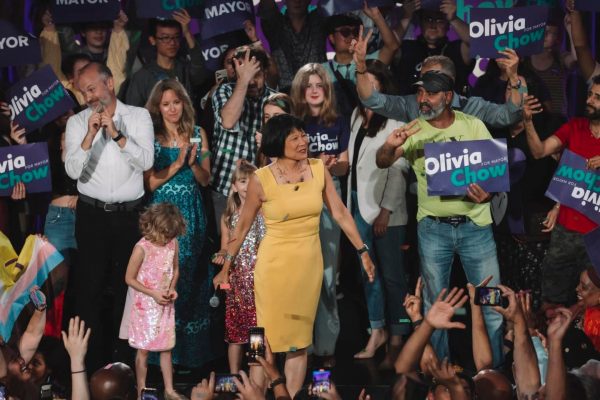
It’s been a heck of a long time since a new mayor took office with the goal of doing something to build the city, as opposed to halting something they believed residents didn’t like, need, or could afford. Rob Ford wanted to take apart most of what he saw inside 100 Queen West. John Tory, in turn, mainly sold himself as someone who could halt Ford’s three-ring circus.
Olivia Chow, who was sworn in yesterday, arrived on a bike — a signal, both symbolic and programmatic, that she’s got strong ideas about mobility. Also ideas about confronting the city’s financial tribulations using strategies besides pixie dust and wishful thinking. What’s more, she ran on a big hairy promise to build affordable housing. And there’s no mistaking the fact that Chow recognizes she has to do something to address public safety concerns.
I could go on and on about what needs to be done — wholesale changes in the way the city thinks about public space, transit, Ontario Place, affordability, etc. While her two-wheeled return to City Hall heralds a most welcome change in tone and priorities, she’d do well to trade up for a hefty cargo bike for all the great expectations trailing behind her.
At such moments, there are a thousand people offering the new mayor unsolicited advice, good, bad, indifferent; some of it malicious and some self-interested.
But amidst all that inbound chatter, a few key points are clear.
One, Chow’s window of political opportunity is short — a couple of years, really — and some of her main challengers from the by-election haven’t left the building.
Two, not everything can or will get done in a council where a mayor still has to win votes. As previous mayors know all too well, it’s one thing to put a program in the oven, but quite another to get it properly cooked and ready to serve.
Beyond those garden-variety observations, it seems to me that Chow’s mandate consists of a mix of short- and long-term agendas, all of them important but some more amenable to rapid action than others.
Chow has already called a special meeting for August to deal with the city’s budget woes. She has a mandate to increase taxes and I’m guessing she’ll push through new revenue tools in short order. I’ve also heard rumblings that her emissaries are looking at finding new ways of pressuring Ottawa to take action to offset structural big city deficits.
None of this is easy, and there will be caterwauling from the usual critics. But if Chow’s got the votes, which I suspect she does, there will be new revenue sources she can point to within a year, including some that will be front-end loaded in the current budget cycle.
Similarly, because the new CAO now reports directly to the mayor, Chow has more ability to push policy initiatives through the bureaucracy.
By contrast, the longer-term promises — and particularly affordable housing — are the ones most vulnerable to becoming sidetracked or derailed entirely by ponderous processes, some entirely outside the city’s jurisdiction and subject to imponderables, like interest rate hikes or labour market constraints.
One obvious and easy fix here is for Chow, who will set the budget, to significantly boost the planning department’s operating funds so chief planner Gregg Lintern can bulk up his staff to process more applications, and thereby reduce the time-risk and delays associated with the construction of almost everything. A raft of land-use/zoning reforms are either in place or on their way, so it now falls to the civil service to ensure the bylaws enabling intensification actually produce intensification.
However, Chow’s central housing promise — 25,000 new rental units, almost half of which will be either affordable or rent-geared-to-income, over eight years — will be a tougher nut to crack, especially in a high-interest rate environment.
To my eye, she and her team could benefit by doing a rapid and unsentimental post-mortem on what went right and what went sideways with the city’s two main efforts to intensify municipally-owned land: the long-running revitalization of Toronto Community Housing complexes such as Regent Park and Lawrence Heights, and John Tory’s sluggish Housing Now program, which has yet to deliver a single completed apartment.
Both relied, to a greater or lesser degree, on a public-private partnership model that pivoted on negotiating profit-sharing deals with developers. It’s probably too soon to hand down a verdict on Housing Now, but the TCHC program has delivered modest results from an affordable housing point of view. Yes, TCHC got new RGI buildings to replace the old ones, but the private partners have been the big winners. In Regent Park, for example, 20 years of redevelopment has yielded very little in the way of net new affordable or RGI housing.
Perhaps it’s no longer possible to build affordable housing outside the context of Triple Ps. But the reality is that no one’s tried it in years, and this despite the fact that Ontario, once upon a time, had a robust social housing development industry capable of cranking out thousands of non-profit rental apartments. Seems to me that we gave the P3 housing model a generous amount of time to prove itself, and the results are, well, meh.
As for the process piece, which is dull but determinative, I’d argue that it makes no sense for a Chow administration to re-invent the wheel with a new agency. However, the mayor must immediately clean house at CreateTO and install a senior management dream team with direct links into the planning department as well as incentives or performance bonuses based on their ability to drive projects through the pipeline. Chow, in turn, should also be prepared to play the bad cop and provide her officials with whatever political cover they need in order to get the job done.
There’s no question in my mind that the city has a long list of potential sites, as became clear immediately after John Tory’s re-election in 2018, when he launched Housing Now. A lack of addresses isn’t the problem. Rather, what Chow and her team need to figure out is how to rapidly accelerate the approvals, design and development process — something that never really happened with Housing Now.
Chow should also find a way to apply sustained pressure on the federal Liberals and Canada Mortgage and Housing Corp. to actually allocate the unspent billions earmarked for affordable rental — another bird that Tory refused to dog.
The new mayor will have a honeymoon, of course, but she’s only got so much political capital to spend, and the tax/fee hikes will gobble up a hefty chunk of it right away. The Ford government, in turn, remains an X-factor, and we’ll see, soon enough, whether the premier and his municipal affairs and housing czar Steve Clark attempt to frustrate her agenda or hive off even more of the city’s political and administrative authority.
Within this complex political configuration, a Chow-driven affordable housing campaign, led by impatient officials, seems to offer up a space for compromise and win-wins with Queen’s Park. Indeed, if Chow tackles her long-term promise to deliver thousands of new affordable rental units with the urgency of an actual dumpster fire, she could potentially turn the page on Toronto’s chronic inability to provide, at scale, the kind of housing its residents truly need.




